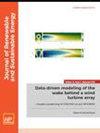A fault severity quantification approach of photovoltaic array based on pre-estimation and fine-tuning of fault parameters
IF 1.9
4区 工程技术
Q4 ENERGY & FUELS
引用次数: 0
Abstract
Harsh outdoor operations may cause various abnormalities or faults of photovoltaic (PV) array, decrease the energy yield and lifespan, and even cause catastrophic events. Recently, many approaches have been successfully applied to the fault diagnosis for PV arrays. However, few studies investigate the evaluation and quantification of fault severity. The quantified fault severity can facilitate the fault severity-dependent maintenance of PV system. In this paper, a fault severity quantification approach based on pre-estimation and fine-tuning of fault parameters is proposed. The key features of the I–V characteristics under different faults are determined to train a backpropagation neural network for estimating the preliminary diagnosis and quantification results. Then, the particle swarm optimizer is further used to locally optimize the estimated results to improve the accuracy of quantified fault severity. Compared with other diagnosis approaches, the experimental results verify that the proposed fault diagnosis and quantification approach obtains higher accuracy with decent computational speed. The proposed method is suitable for the fault severity-dependent maintenance of the PV systems.基于故障参数预估和微调的光伏阵列故障严重性量化方法
严酷的室外作业可能会导致光伏阵列出现各种异常或故障,降低发电量和使用寿命,甚至引发灾难性事件。最近,许多方法已成功应用于光伏阵列的故障诊断。然而,很少有研究对故障严重性进行评估和量化。量化的故障严重性有助于光伏系统根据故障严重性进行维护。本文提出了一种基于故障参数预估和微调的故障严重性量化方法。通过确定不同故障下 I-V 特性的关键特征来训练反向传播神经网络,以估计初步诊断和量化结果。然后,进一步使用粒子群优化器对估计结果进行局部优化,以提高量化故障严重程度的准确性。与其他诊断方法相比,实验结果验证了所提出的故障诊断和量化方法具有更高的准确性和更快的计算速度。所提出的方法适用于根据故障严重程度对光伏系统进行维护。
本文章由计算机程序翻译,如有差异,请以英文原文为准。
求助全文
约1分钟内获得全文
求助全文
来源期刊

Journal of Renewable and Sustainable Energy
ENERGY & FUELS-ENERGY & FUELS
CiteScore
4.30
自引率
12.00%
发文量
122
审稿时长
4.2 months
期刊介绍:
The Journal of Renewable and Sustainable Energy (JRSE) is an interdisciplinary, peer-reviewed journal covering all areas of renewable and sustainable energy relevant to the physical science and engineering communities. The interdisciplinary approach of the publication ensures that the editors draw from researchers worldwide in a diverse range of fields.
Topics covered include:
Renewable energy economics and policy
Renewable energy resource assessment
Solar energy: photovoltaics, solar thermal energy, solar energy for fuels
Wind energy: wind farms, rotors and blades, on- and offshore wind conditions, aerodynamics, fluid dynamics
Bioenergy: biofuels, biomass conversion, artificial photosynthesis
Distributed energy generation: rooftop PV, distributed fuel cells, distributed wind, micro-hydrogen power generation
Power distribution & systems modeling: power electronics and controls, smart grid
Energy efficient buildings: smart windows, PV, wind, power management
Energy conversion: flexoelectric, piezoelectric, thermoelectric, other technologies
Energy storage: batteries, supercapacitors, hydrogen storage, other fuels
Fuel cells: proton exchange membrane cells, solid oxide cells, hybrid fuel cells, other
Marine and hydroelectric energy: dams, tides, waves, other
Transportation: alternative vehicle technologies, plug-in technologies, other
Geothermal energy
 求助内容:
求助内容: 应助结果提醒方式:
应助结果提醒方式:


